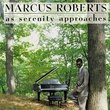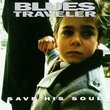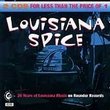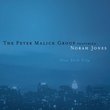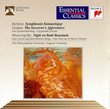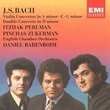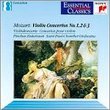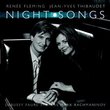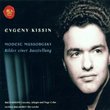| All Artists: Maurizio Pollini, Arnold Schoenberg, Anton Webern Title: Maurizio Pollini Edition - Schoenberg: The Solo Piano Music, Piano Concerto; Webern: VAriations Op. 27 Members Wishing: 0 Total Copies: 0 Label: Deutsche Grammophon Release Date: 2/11/2003 Genre: Classical Styles: Chamber Music, Forms & Genres, Concertos, Suites, Historical Periods, Classical (c.1770-1830), Modern, 20th, & 21st Century, Instruments, Keyboard Number of Discs: 1 SwapaCD Credits: 1 UPC: 028947136125 |
Search - Maurizio Pollini, Arnold Schoenberg, Anton Webern :: Maurizio Pollini Edition - Schoenberg: The Solo Piano Music, Piano Concerto; Webern: VAriations Op. 27
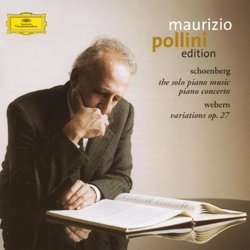 | Maurizio Pollini, Arnold Schoenberg, Anton Webern Maurizio Pollini Edition - Schoenberg: The Solo Piano Music, Piano Concerto; Webern: VAriations Op. 27 Genre: Classical |
Larger Image |
CD DetailsSimilarly Requested CDs
|
CD ReviewsDost thou savor dissonance? Lord Chimp | Monkey World | 05/12/2005 (5 out of 5 stars) "Schoenberg's solo piano music is small in quantity, but tremendously important in so many respects that an excellent performance is necessary for any listener of 20th century modernism. I would guess, however, that these works would pose a formidable task for the performer. Consider op.11, the three small pieces for piano. This work at last exploded the Western conventions of tonality. At the time, Schoenberg's atonal mode of expression was new and highly intuitive, so traditional interpretational paradigms would probably not serve the musician well. Thus even as the technical difficulties are overcome, the intellectual challenge remains great. Perhaps this is why so few pianists ever tackle twentieth century piano music (among other reasons). Pollini is considered one of the premiere Schoenberg interpreters, and the evidence is strong in his favor. His performance here is emotionally powerful but also cool and calculated. (The idiosyncratic Glenn Gould's performances of Schoenberg's works are also recommended.) The vestiges of tonality still linger in Schoenberg's op.11, at least in the first two pieces. The third really drove home the possibilities of atonality, though -- the musical argument is evasive to the inattentive listener, and even those of diligent concentration are hard pressed. Schoenberg's end here was to create a more egalitarian music, a radical chromaticism where each tone is important in itself rather than in its relation to the central key. One cannot help but feel the excitement of the composer in these works, something for which pollini must be commended. It is good that these solo works are presented in chronological order, as it enables the listener to chart the fascinating development of Schoenberg's approach. I do not wish to discuss these works in detail. I will make only cursory remarks to explain why I think they are interesting. The six piano pieces of op.19 are necessarily short musical dictums that, once capitulated, need not be further developed. They are just little ideas, but they are powerful in their succinctness. In op.23, Schoenberg experiments in finding an organizational principle for atonal music. He applies serialism. Listening to these small pieces is highly valuable for the listener of serial music, because it trains one to recognize the permutations of tone rows; op.23 applies the serialist method to small groups of notes rather than the full chromatic scale. Op.25 is the first fully 12-tone work - the six pieces are all developed from manipulation of a single tone-row. It is inventive and exciting, not to mention difficult to play. Several years later Schoenberg returned to solo piano music with op.33, two short pieces structured more along a chordal idiom than a melodic one. Alone, Schoenberg's solo piano music is some of the best of its genre of the twentieth century. This disc is worth having for that alone. This edition includes other pieces, tho': Schoenberg's piano concerto, and Webern's outstanding Variations for solo piano. DG has a disc of the solo piano music by itself, but there is no reason to get that when this edition exists. The piano concerto, op.42, is a dramatic 12-tone work, one of my favorites of the 20th century. It is a drastically modern work, full of vivid colors and restless, percussive solo parts, yet Schoenberg sometimes manipulates the tone row for the deployment of quasi-tonal orchestral waves. Despite its rigorous structure and uninviting dissonances by the ream, the work maintains a degree of romanticism -- something the Darmstadt school may have derided, but this listener feels it functions on an effective emotional level. Webern's Variations may have been more to the preference of folks like Boulez and Nono -- it is systematically certain in its serialist methodology (Schoenberg was more relaxed in the application of the 12-tone structures). In addition to being deliciously dissonant and innately raw, it is an exciting display of virtuosity. Pollini shines here as with his Schoenberg interpretations. HIGHLY RECOMMENDED. " The Brilliant Best of Schoenberg's Piano Music Paul S. Rottenberg | Ft. Lauderdale, FL | 03/12/2008 (5 out of 5 stars) "This cd contains what is simply the best recordings of all of Schoenberg's solo piano music and of his Piano Concerto. Pollini is brilliant in establishing this music as the modern decendant of Brahms. Everything sounds completely musical and logical (it makes sense musically--sounds natural). It sounds as if Brahms had lived into the 20th Century. The contribution of Abbado in the performance of the Piano Concerto is not to be overlooked, either. Abbado is probably the finest conductor of the music of the "Second Vienese School," and this performance is no exception. Only Glenn Gould comes close to Pollini in this music, and his (Sony) recording is from the 60's with dry sound. Pollini is much warmer and more musical. A great recording!" Lonely modernist landscapes. Perfect music for the isolated dv_forever | Michigan, USA | 06/02/2007 (5 out of 5 stars) "I'll come out and say it, Schoenberg is not a composer I really care about. I revel in the beauty of Verklarte Nacht but things like Pelleas und Melisande, Gurrelieder, Pierrot Lunaire, Variations for Orchestra, etc. don't appeal to me. Overall, it's Webern who appeals to me in more of his output, not Schoenberg.
But then there is Schoenberg's solo piano music which seems far more personal than the rhetorical works like Variations for Orchestra. Pollini is a master pianist who has been dedicated to modern repertoire all his life, this CD is a testament to his advocacy and understanding of this music. Apart from the solo piano music, you also get the piano concerto with Abbado leading the Berlin Philharmonic. I am not won over by the Concerto as much as the solo pieces. In this work, Schoenberg being full aware of the great German tradition, tries to fuse the form of the romantic concerto with his own brand of new modern logic. In particular, the Robert Schumann concerto doesn't seem too far from Schoenberg's mind. It's because this harkens back to the old traditional form that many pianists who don't normally explore modern repertoire have come to record the Schoenberg piano concerto. I am thinking of Alfred Brendel and Mitsuko Uchida. Pollini, on the hand, is of course a modern specialist, so this concerto is right up his alley. For this Pollini Edition re-release, not only do you get the piano concerto as an extra, they also throw in Webern's Variations for solo piano, making this CD a winner on all fronts. Listen to the solo pieces, alone at night and be captured by the unique way that Schoenberg distills the essence of modern alienation." |

